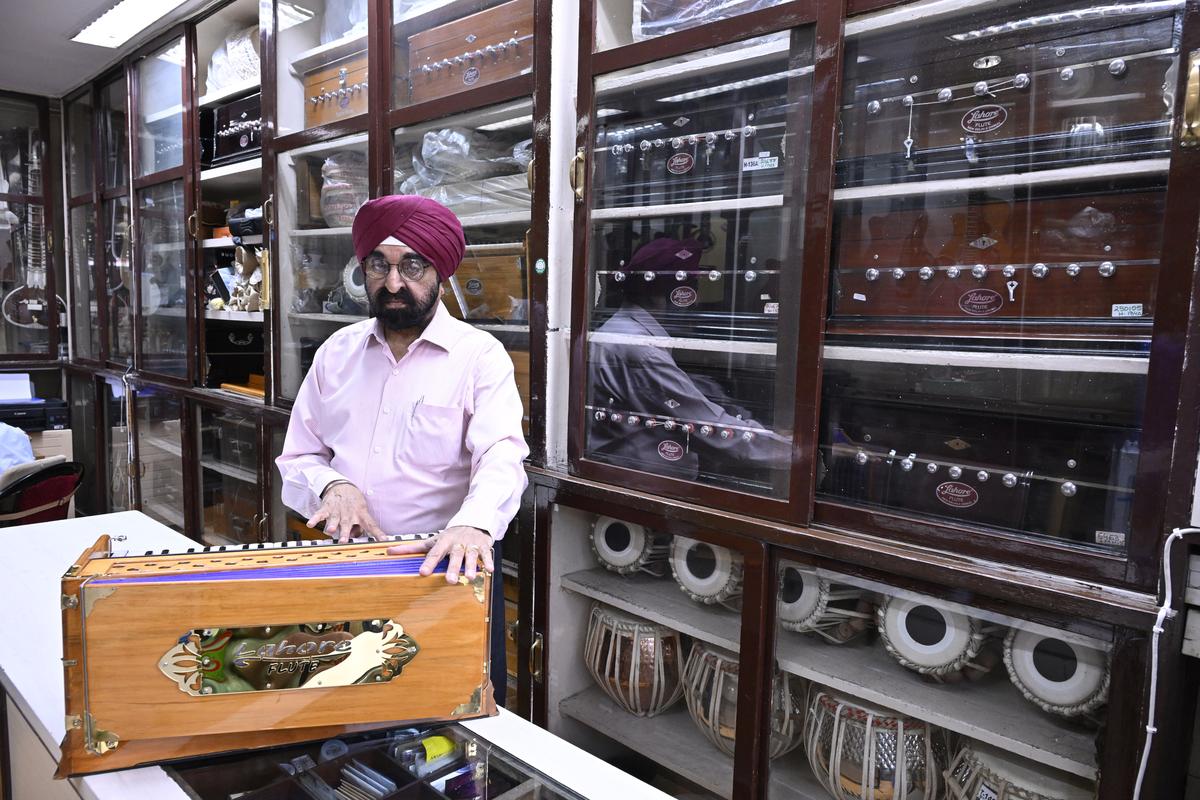Music all the way – The Hindu

Jaspal Singh (standing) with his elder brother Randheer Singh Sachdeva at their shop, the Lahore Music House in Daryaganj
| Photo Credit: Shiv Kumar Pushpakar
The historic Daryaganj market does not shy away from chaos. Amid the uproar of traffic, hawkers, and everything characteristically Old Delhi, a store in Daryaganj hums the soothing sound of musical instruments.Lahore Music House (LMH) carries a legacy of 115 years of dealing in musical instruments, from a folk dilruba to a rock guitar.
Randheer and Jaspal Singh are the fourth generation owners of the store, which was originally established in 1910 in Anarkali Bazaar of Lahore, present-day Pakistan.
After the Partition, the store moved to its current location beside the iconic Moti Mahal restaurant in 1948. A ‘Daryaganj Music Street’ was established soon, flanked with music shops dime a dozen. “Daryaganj was half of what it is now when we started. It became a trend to start a music dealership here, and even for those with no knowledge of music set up shops ,” says Jaspal Singh.
The storeis modest in appearance and the only one without any other branch. Qawwals and classical musicians from all over the world source from us. We don’t get much footfall in the store, but our dealers and exports keep us busy,” says Jaspal.
Exports are sustained by countries with strong Indian communities abroad including Mauritius, Suriname, Fiji, and Trinidad. Jaspal says a culture of Indian traditional music runs in these countries.

Jaspal Singh at Lahore Music House, Daryaganj
| Photo Credit:
Shiv Kumar Pushpakar
Recalling the fad for Indian music during the 1970s to 1990s hippie culture, he says, “Foreigners visiting Delhi during those years would stop by Moti Mahal for a meal, and take home a tabla from Lahore Music House on their way back!”
Though over the years guitars and synthesisers flooded the market, LMH did not bury its specialisation in traditional instruments.
“Earlier schools used to teach students to play the sitar. Not many bother to explore other traditional instruments such as the santoor, sarod, sarangi or esraj. A guitar to showcase is all they seek now,” bemoans Jaspal.
The legacy of LMH did not go unnoticed by legends of music from the subcontinent. Ghulam Ali, Nusrat Fateh Ali Khan, and Mehdi Hassan were regulars. “Begum Akhtar used to treat us like a service station. She would come to drop a baja off, and take another one with her,” says Jaspal, who would return from school to find musical legends at his father’s desk.
Once in the 1960s, English rock band The Beatles visited LMH. “Neither me nor my father knew who they were. A huge crowd had gathered outside the store. The members requested for a sitar at their hotel and later even offered my father to move to London to teach them the sitar,” reminisces Jaspal.
LMH stands out not just for quality but also for the city it represents. “We get asked by people why we retain the name. Following the Partition, the production of instruments split to Amritsar, Patiala and Delhi but his family did not forget their birthplace. “Even today in our labels, we write with pride, Lahore Flutes, Made in India.”
Published – July 18, 2025 11:21 am IST